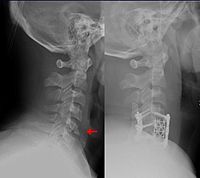
Photo from wikipedia
Long-term outcomes in patients undergoing emergency versus elective resection for colorectal cancer (CRC) are discussed controversially. This study aims to assess long-term outcomes of emergency versus elective CRC surgery. Single-center… Click to show full abstract
Long-term outcomes in patients undergoing emergency versus elective resection for colorectal cancer (CRC) are discussed controversially. This study aims to assess long-term outcomes of emergency versus elective CRC surgery. Single-center retrospective cohort study. Patients undergoing emergency or elective CRC surgery from July 2002 to January 2013 were included. Primary outcome was 5-year survival, secondary outcomes were in-hospital mortality and local tumor recurrence. Overall, 475 patients were included. Median age was 69.0 (IQR 59.0–77.0) years. A total of 141 patients (30%) were operated for rectal cancer and 334 patients (70%) for colon cancer. Median follow-up was 445 (IQR 67–1409) days. Emergency resection was performed in 105 patients (22%) due to obstruction, perforation, or bleeding. Stage IV tumors and ASA scores≥ 3 were significantly more frequent in the emergency than in the elective resection group (39.0% vs. 33.5%, p < 0.001; 75.5% vs. 61.3%, p = 0.003). The rate of patients with positive lymph nodes was similar in the two groups (46.2% vs. 46.3%, p = 1.000). In-hospital mortality was significantly higher in the emergency CRC versus the elective CRC group (8.4% vs. 3.0%, p = 0.023). Five-year survival (aHR 1.38; 95%CI 0.81–2.37, p = 0.237) or local tumor recurrence (aHR 1.48; 95%CI 0.47–4.66, p = 0.500) were not significantly different in patients undergoing emergency versus elective surgery for CRC. In-hospital mortality was increased in emergency versus elective CRC resections. However, 5-year survival and local recurrence after surgery for CRC were determined by the tumor stage, and not by the emergency versus elective setting of surgical resection.
Journal Title: International Journal of Colorectal Disease
Year Published: 2019
Link to full text (if available)
Share on Social Media: Sign Up to like & get
recommendations!